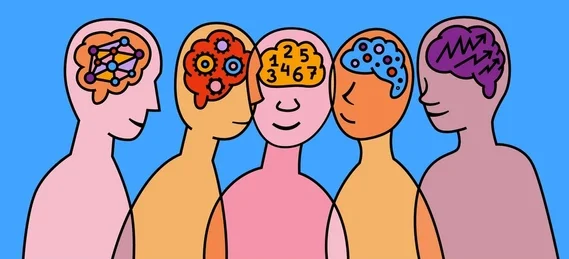Grief is a complex and overwhelming experience for anyone. But for people who are autistic and/or ADHD, grief often presents additional challenges due to differences in sensory processing, communication preferences, emotional regulation, and executive functioning. By having a deeper understanding of neurodiversity, we can provide better grief support for all neurotypes.
Neuronormative Expectations of Grief
Although we all grieve differently, it is undeniable that there are certain societal expectations regarding grief. These include assumptions such as the requirement to hold a funeral or memorial service, the tradition of wearing formal or black clothing to these events, the belief that you should be surrounded by loved ones instead of alone during the initial bereavement period, and the expectation that you should take time off work or stay home – along with the judgement that if you don’t, this means you’re ignoring the loss or didn’t care about the person. Additionally, there are unspoken rules about what kinds of questions are considered impolite or intrusive, such as asking about the specifics of the loss in cases of unexpected deaths. There are also societal judgements around what is ‘acceptable’ to grieve – pet loss, mourning a celebrity, or grieving an online friend or fictional character may be dismissed as less valid grief by neuronormative standards.
These expectations and assumptions may not align with the diverse ways in which neurodivergent individuals experience and express their grief.
The Unique Grief Challenges Associated with ADHD and Autism
Disruption of Routine During Grief
Routine and predictability are essential for many neurodivergent people. They provide a sense of stability and safety, reduce cognitive load and decision fatigue, and create a sense of control. When that routine or structure is disrupted – such as due to the loss of a loved one, a significant life transition, or other major changes in daily life – the impact can be particularly overwhelming.
Bereavement in particular often leads to major disruption to routines. For children, this might involve things like moving house to live with new people, or changing schools due to becoming a single-parent household. For adults, it might mean losing caregiving responsibilities if they were a carer to an ill family member, or adjusting to new roles within a family as family dynamics shift.
Other types of loss – such as the end of a friendship, a breakup, or major life transitions (e.g. moving from primary school to high school or transitioning from work to retirement) also result in significant disruptions to routine and stability. With these changes also comes other changes – such as shift in identity, a change in hobbies, or reduction in the level of support a person receives. For neurodivergent people in particular, changes to routine or their environment can be especially distressing and hard to adjust to.
Sensory and Social Overwhelm
Funerals or other mourning rituals can be distressing for neurodivergent people for a variety of reasons. For example, a person with ADHD may find sitting still in a church or memorial service for an extended period difficult, yet if they were to move around or fidget or bring focus items this may be misinterpreted as being disrespectful or uncaring. Being on the receiving end of negative assumptions might be especially distressing for a person with ADHD, especially if they struggle with rejection sensitivity.
The sensory and social aspects of grief rituals can also be overwhelming for autistic people – for example, memorial services often include many sensory aspects including smells (incense, flowers, candles), unfamiliar textures (formal attire, suits), as well as music, crowded rooms, and increased social interactions – at a time when the individual is already emotionally drained.
Emotional Regulation Differences
Many neurodivergent people find it difficult to regulate big emotions, or they may describe feeling emotions more deeply than other people. Grief is known to lead to a range of strong emotions such as anger, sadness and guilt – which can be even more intense for autistic or ADHD individuals. Unfortunately, this emotional intensity can often lead to increased conflicts, relationship difficulties, or social withdrawal, thus taking away critical support when it’s needed most or exacerbating negative emotions.
Some neurodivergent individuals also experience alexithymia, which refers to difficulty identifying their emotions. This can result in feelings of guilt or shame if they don’t feel like they are grieving ‘normally’, or similarly family and friends can be confused as to why they don’t appear to be grieving.
Executive Functioning and Grief
Many neurodivergent people have difficulties with executive functioning. This can include difficulties with memory, organisation, planning, and task initiation. When the mind and body are under stress (such as during grief), executive function can be even more difficult. Yet in a cruel twist, grief often demands a high level of executive functioning, with urgent tasks like organising a funeral, managing financial paperwork, contacting family members, and coordinating with professionals (e.g., lawyers, estate managers). This increased demand on already limited resources can lead to a vicious cycle: as energy is redirected toward grief-related tasks, everyday activities can suffer. Individuals might become more forgetful, may struggle with motivation for daily tasks such as cooking and cleaning or personal hygiene, or have difficulty completing tasks for work or school, which can lead to feelings of shame, judgement, or low self-esteem.
Strategies to Support a Neurodivergent Individual Through Grief
-
- Respect their communication and support preferences. Don’t assume they want to be visited in person, which can be draining. Instead, ask about their preferred ways of communication and support (e.g. phone calls, texting, photos or visuals, food drops, etc).
- Avoid judging their outward emotional responses. Do not make assumptions about someone’s internal state from what you can observe on the outside. Due to masking, or just due to the different ways grief can be expressed, a neurodivergent person might appear ‘fine’ but actually be experiencing deep emotions internally.
- Be prepared to answer direct questions about the loss. Many autistic people need clear, factual information (which can be considered rude by neurotypical standards). Be patient and open to discussing details if they ask, as this can be a crucial part of processing their grief.
- Remember that physical touch is not comforting to everyone. Physical contact like hugging or deep eye contact is often seen as a way to show affection or care by neurotypical standards. But this may be uncomfortable for some neurodivergent people. Always ask before assuming physical contact is welcome or desired.
- Offer alternative ways to process grief. For people with ADHD, being confined at home or sitting still in their grief can lead to restlessness and agitation. Instead, consider engaging in activities like walking while talking, doing a shared activity together, or expressing emotions through art or other creative outlets. Read our blog about expressing grief through art here!
- Honour commitments and be predictable. Many neurodivergent people struggle with unexpected changes – so if you plan to visit or offer support, ask in advance, and always stick to the agreed time and plan.
Strategies to Support Your Grief (if you are Neurodivergent)
-
- Find meaningful ways to maintain a connection with loved ones who have passed away. Maintaining a connection with the person who has died is an important part of learning to live with grief. If traditional methods such as prayer or looking at old photos feels too abstract, consider more tangible ways to connect with them such as writing a letter to them, or engaging in an activity that is meaningful to you (e.g. cooking their favourite dish, using their favourite coffee cup).
- Prioritise sensory needs. Consider what you can do to honour your sensory needs e.g. comfortable clothing, using headphones, utilising sensory objects such as weighted blankets. Also consider what boundaries you may need to implement – saying no to visitors, or attending some social events but not others. Make the choice that’s right for you, even if that differs from social norms or family expectations.
- Executive functioning supports. When executive functioning is low or your capacity is fully maxed out on grief related tasks, consider how you can simplify tasks of daily life. For example, can you buy pre-cut vegetables in order to save time and energy? Can you shop online and get things delivered rather than going to the shops? Can you hire a cleaner or ask a friend for help? Be kind to yourself and honour your capacity – and challenge assumptions of what you ‘should’ be able to do.
- Engage in your special interests. Neurodivergent special interests (sometimes nicknamed SPINs) can be a huge source of comfort and stability during difficult times. Don’t hesitate to immerse yourself in these activities – they can be deeply regulating and restorative.
Neurodivergent people might be different – but differences are not deficits! By recognising and accommodating these differences – whether it’s the need for a stable routine, creating sensory-friendly environments, challenging social norms, or adjusting expectations around executive functioning during times of acute stress – we can create more inclusive and supportive environments for those processing grief, for all neurotypes.
Written by Lucy Archinal-Hudson
Lucy Archinal-Hudson is a clinical psychologist and neurodivergent woman. She sees a variety of mental health issues in her private practice, Archwise Psychology, and regularly posts on Instagram at @lucy.psych



